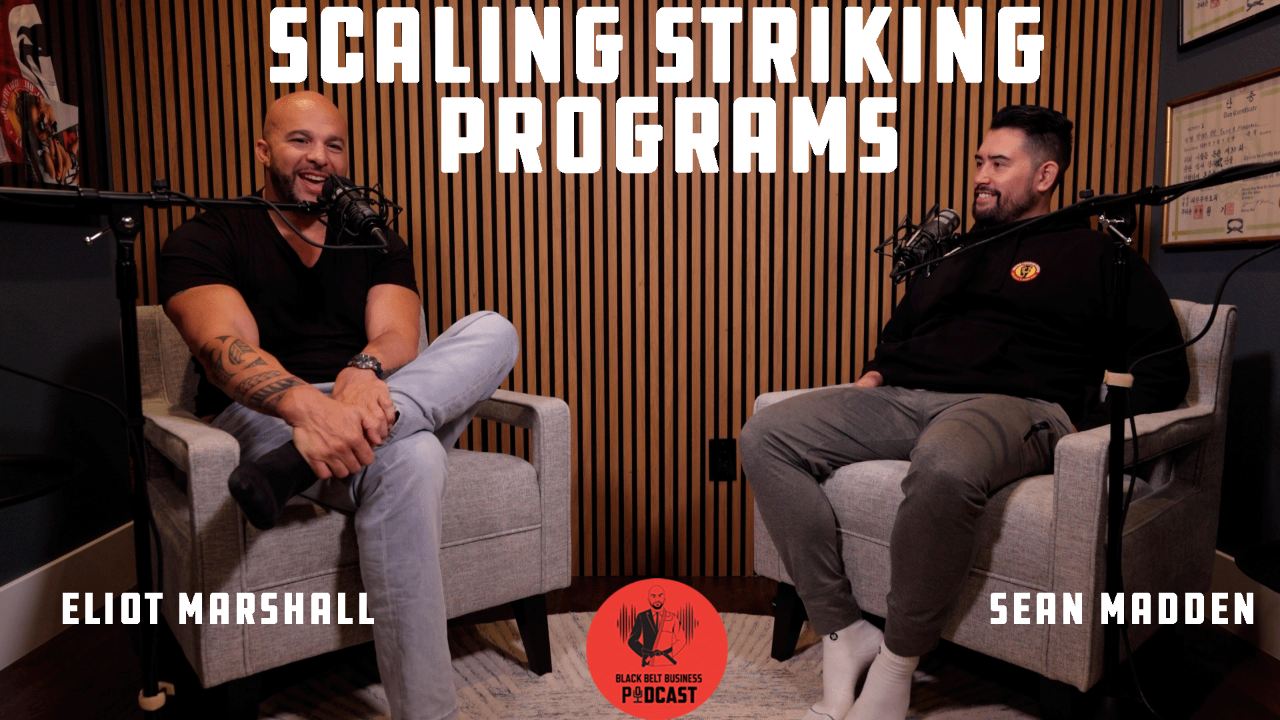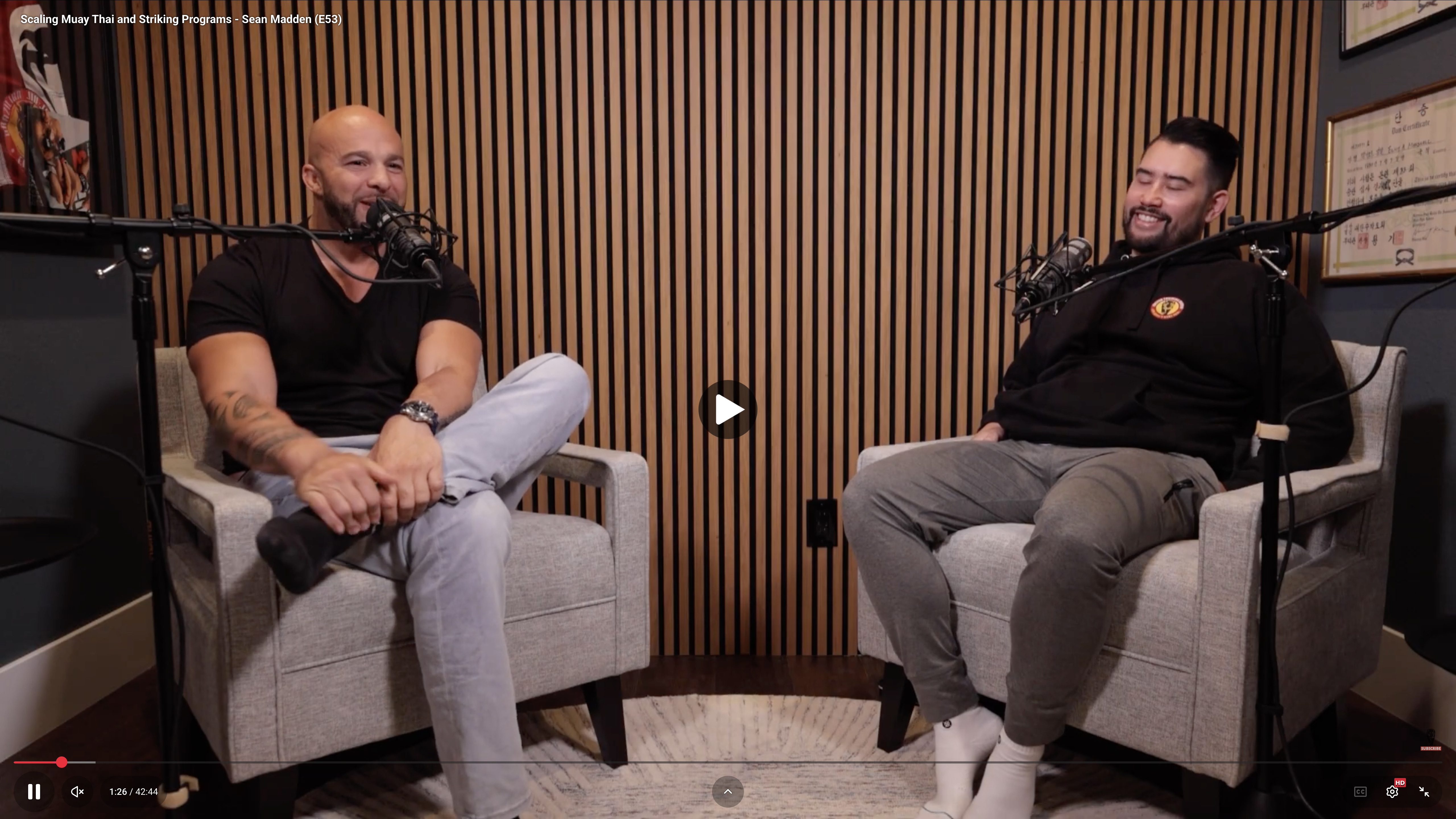Scaling Muay Thai and Striking Programs - Sean Madden (E53)
Nov 19, 2025
Episode 53 of the Black Belt Business Podcast features Easton Co-Owner Eliot Marshall and Easton’s Muay Thai Program Director, Sean Madden, unpacking the evolution of Easton’s striking program: from its raw, fighter-driven beginnings to a scalable, structured curriculum that supports 8 thriving academies.
While the episode focuses on Muay Thai, the lessons apply to every martial arts school owner: you can’t scale on passion alone. You scale through systems.
From “Just Teaching Classes” to Building a Real Program
Easton’s striking program beginnings were much different from the present day . Back then, classes were taught by high-level fighters who were “focused on fighting” first and foremost. Teaching was something done between training camps, not the foundation of a long-term program.
Classes were exciting, but inconsistent. Curriculum was minimal, sometimes fitting on a single piece of paper. And the schedule served the instructors more than the students.
The classes “looked busy” from the outside, but attendance hovered around the same 30–50 people each week. There was no mechanism for progression, retention, or growth.
This is a common trap for martial arts schools. When owners are active fighters or technicians first, they tend to rely on charisma and passion instead of structure.
The result: programs that cap out early, stagnate, and fail to scale.
Why Systems Matter More Than Talent
One of the core themes of Episode 53 is the difference between teaching classes and building a program.
Teaching is what happens for an hour on the mat.
A program is what happens between classes — the planning, curriculum development, instructor training, progression models, culture, and systems that make growth possible.
Sean explains that as Easton grew to multiple locations, the team had to get serious about systemizing everything.
There wasn’t “eight of him” to personally go fix problems across schools in Denver, Boulder, Arvada, Littleton, and beyond.
Without systems, scale is impossible.
The Turning Point: Structure, Progression, and Focus
When Easton opened its massive Denver Training Center , with 10,000 square feet (half of which was dedicated to striking), the urgency to professionalize intensified.
With that much space and that much responsibility, someone had to take the lead.
Key changes followed:
1. Class Structure
Easton stopped relying on whatever the coach felt like teaching that day. Lesson plans became intentional, consistent, and tied to long-term goals.
2. A Real Ranking System
We introduced a formal progression model — a hot topic in Muay Thai but essential for student motivation, retention, and clarity.
3. Defining the Hedgehog Concept
Borrowing from Jim Collins’ Good to Great, Easton clarified what they could be “the best in the world at” and doubled down on jiu jitsu and Muay Thai, instead of trying to be everything to everyone.
4. Building Outside the Classroom
Perhaps the biggest shift: realizing that the true work of running a martial arts program happens off the mats — creating systems, developing staff, and improving operations.
What School Owners Can Learn from Easton’s Evolution
You can’t scale by yourself.
If you’re teaching 26 classes a week, you’ll never find time to build the systems needed for growth.
You need structure more than you need talent.
Even great instructors cap out quickly without curriculum, consistency, and progression.
A “raw” fight culture doesn’t make your school legitimate.
Eliot and Sean explain that many Muay Thai or boxing gyms resist structure because they want to “keep it raw.” But raw doesn’t scale — and raw doesn’t pay the bills.
Your program should serve the students, not the instructors.
If classes only exist during the hour they’re taught, your school is just “existing,” not growing.
The End Result: A Scalable, High-Quality Striking Program
By shifting away from personality-driven coaching and toward system-driven development, Easton transformed a once-inconsistent program into one of the most respected Muay Thai academies in the region.
The episode is a reminder that:
Passion starts an academy.
Systems grow it.
Structure scales it.
Get the Easton.Online Podcast directly to your inbox!
Enter your details below to get email notifications when new episodes get published.
We hate SPAM. We will never sell your information, for any reason.








